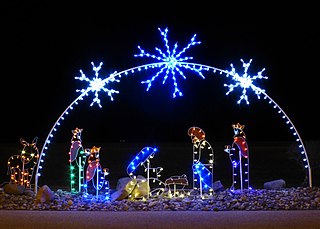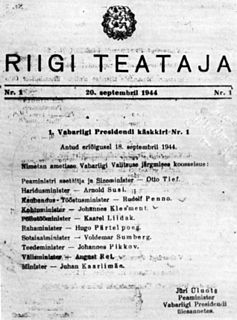 W
WThe 100th Anniversary of the Estonian Republic is an official government program for the celebration of the Republic of Estonia's 100th anniversary. The official anniversary was marked on 24 February 2018, while related celebrations and events took place from April 2017 to February 2020.
 W
WChristmas is an annual festival commemorating the birth of Jesus Christ, observed primarily on December 25 as a religious and cultural celebration by billions of people around the world. A feast central to the Christian liturgical year, it is preceded by the season of Advent or the Nativity Fast and initiates the season of Christmastide, which historically in the West lasts twelve days and culminates on Twelfth Night. Christmas Day is a public holiday in many countries, is celebrated religiously by a majority of Christians, as well as culturally by many non-Christians, and forms an integral part of the holiday season organized around it.
 W
WChristmas Eve is the evening or entire day before Christmas Day, the festival commemorating the birth of Jesus. Christmas Day is observed around the world, and Christmas Eve is widely observed as a full or partial holiday in anticipation of Christmas Day. Together, both days are considered one of the most culturally significant celebrations in Christendom and Western society.
 W
WGood Friday is a Christian holiday commemorating the crucifixion of Jesus and his death at Calvary. It is observed during Holy Week as part of the Paschal Triduum. It is also known as Holy Friday, Great Friday, Great and Holy Friday, and Black Friday.
 W
WIndependence Day is a national holiday in Estonia marking the anniversary of the Estonian Declaration of Independence in 1918. It is commonly celebrated with concerts, parades and parties. It is the national day of Estonia.
 W
WResistance Fighting Day also known as Otto Tief Government Day is a public holiday in Estonia which takes on 22 September. It honors the Estonian commander Otto Tief's attempt to restore Estonian independence in 1944. The holiday is a date of remembrance, commemorating the victims of the subsequent re-establishment of Soviet rule in Estonia following the Nazi rule, and the resulting sovietisation of the republic from 1944–1950. It falls under the cultural symbols designed to recognize the Occupation of the Baltic states until 1991. It was known in the former Estonian SSR, as well as today by the Russian Federation and pro-Russian forces in Estonia as the Day of the Liberation of Tallinn from Nazi Invaders, celebrating the Soviet Tallinn Offensive by the Red Army's 2nd Shock and 8th Armies and the Baltic Fleet against the Wehrmacht.
 W
WVõidupüha or Victory Day in English or the Victory Day in the Battle of Võnnu in Estonian is a public holiday in Estonia which occurs on June 23. The holiday has been celebrated since 1934 and marks the victory of Estonia and neighboring Latvia in the Battle of Cēsis against the Baltische Landeswehr on June 23, 1919.